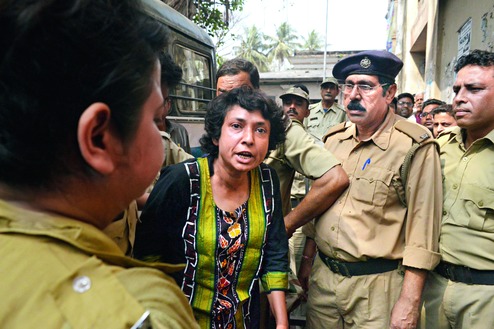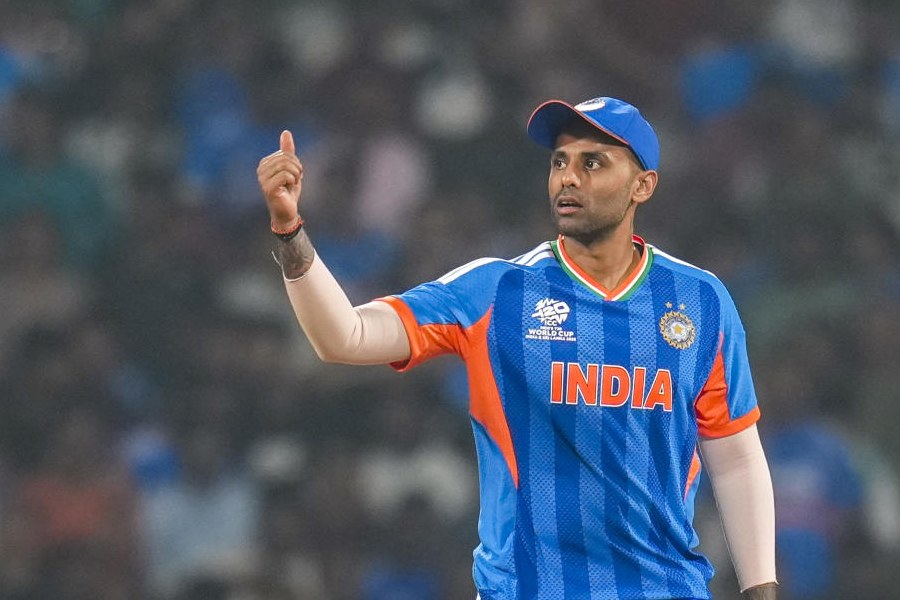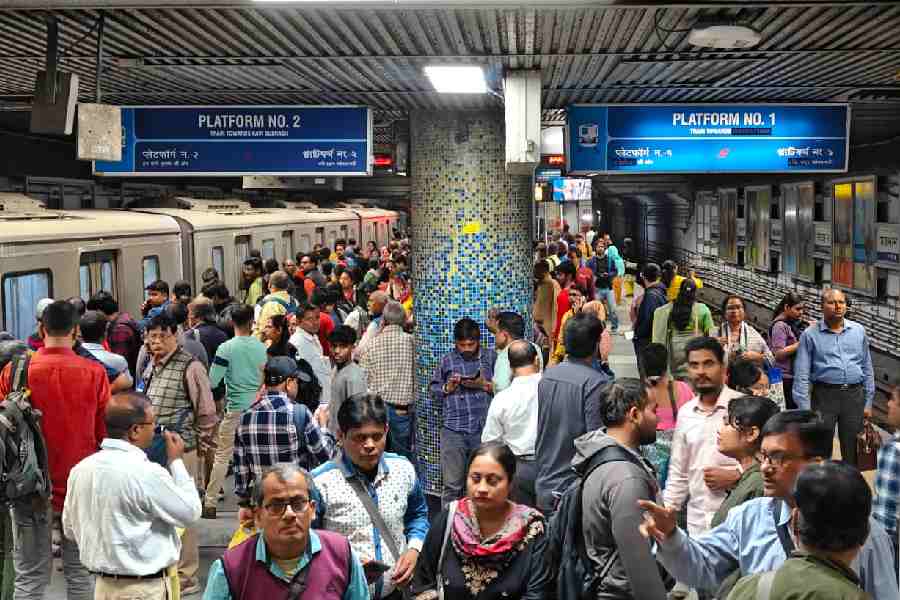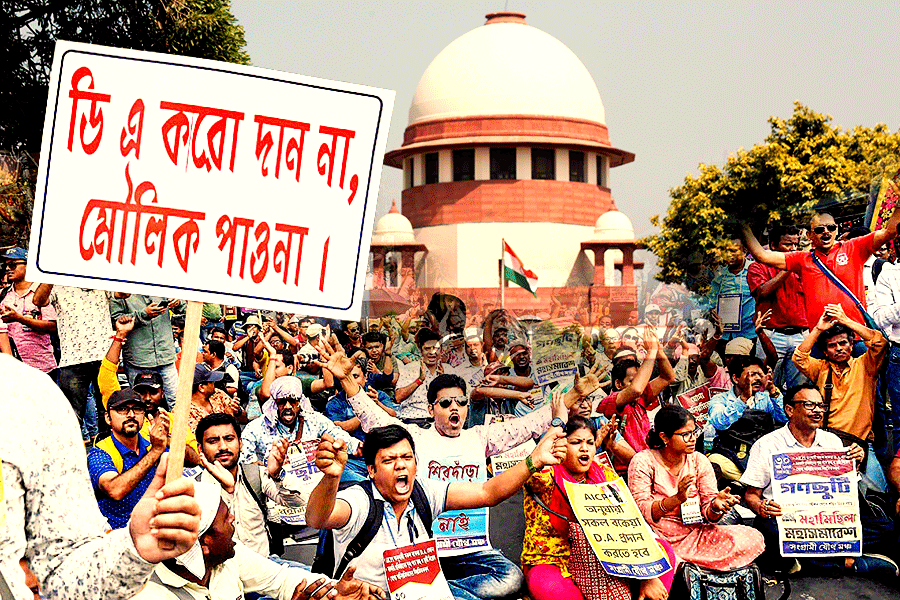


Swapna Choudhury still shudders at the thought of that evening when she looks out at the street from her fourth floor living room of her Salt Lake apartment. That was the evening of January 25. As the wintry fog settled on the eastern horizon, she waited for her daughter Sharmistha - Shumki to her - to arrive home after a long absence.
She had received a call from a villager from Bhangar who had informed her that her daughter was on her way home. Bhangar, some 35 kilometres from Calcutta in the South 24-Parganas, has been the crucible of an anti-land acquisition movement. It was also Sharmistha's theatre.
Sharmistha is a political activist of the Communist Party of India (Marxist-Leninist) Red Star. The CPI(ML) Red Star is not a banned party. It emerged from a 2009 split in the CPI(ML-Red Flag) led by Kanu Sanyal and has contested civic, Assembly and Lok Sabha polls in Bengal, Odisha and Kerala. In fact, Sharmistha contested the Assembly elections from Barrackpore last year as a Red Star candidate.
The Red Star, which is involved in people's movements centred around issues of environment, gender and forcible land acquisition, has been spearheading the farmer's agitation against the state government's move to help set up a power sub-station at Bhangar. Many villagers say the under-construction power grid project has damaged their land and environment. Some claim their land was grabbed and they were not paid adequate compensation. On January 17 this year, two protesting villagers were killed allegedly in police firing. Sharmistha was part of that agitation.
"I rushed to the nearby shop to get some shingara, her favourite snack. I'd made some coffee and tidied up her bedroom," reminisces the 55-year-old. "Normally it takes an hour to reach our home from Bhangar, so when it was 7.30 I had a feeling something terrible had happened."
She switched on the news on television. "The news flash announced that my daughter had been arrested." Swapna was disconsolate, suddenly unable to come to terms with what she'd heard. Two days later she was informed that the police had slapped the Unlawful Activities (Prevention) Act, or UAPA, on Sharmistha. The two sections - 16 and 18 of UAPA - invoked had to do with acts of terrorism and conspiracy and the maximum sentence for it was capital punishment.
"January always ushers in bad news for me," says Swapna. In January 2003, Sharmistha had left home to become a full-time political activist. At the time she was a journalist with The Telegraph, but quit to work as an extreme Left activist. "Shumki was so brilliant a student," Swapna recalls. She wasn't terribly pleased when her daughter topped the Presidency College admission test. "Relatives had told me about the political atmosphere at Presidency. Too much indoctrination and activism. I wanted her to go to Lady Brabourne."
Swapna did not have anyone to share her anxieties with. She had lost her husband when she was just 27. Dr Santosh Choudhury was an orthopaedic surgeon in Durgapur. "He died in a scooter accident while trying to save a little boy near a slum. Shumki was about eight then," she says. The shock left her numb and she had to be put on medication. When she got back on her feet a few weeks later, she found Sharmistha had matured a lot. Swapna eventually took a schoolteacher's job in Calcutta. The daughter of a former railway engineer in Guwahati, Swapna had grown up cloistered and comfortable in bungalows. The going in Calcutta was hard.
The shift from school to college changed Sharmistha. She now rarely spoke to her mother and remained engrossed in books. She often came home late. "We had a big fight when one night I discovered her writing political slogans on posters with alta." Swapna called these political activities "pindi chotkano" (ruining your future).
While Sharmistha was doing her Master's in Journalism at Calcutta University, she got a job with The Telegraph. "I was extremely happy. I thought this would keep her away from political activism," Swapna says. Sharmistha's brush with journalism, however, turned her into a more intense political activist.
During her time at this newspaper, I saw Sharmistha work quietly as she discussed and wrote stories on gender and developmental issues. She rarely expressed her political views in office, would wrap up quickly and rush to meet her fellow activists.
Years later I'd spot her in different places - sometimes in the College Street area, sometimes around Barrackpore on the northern fringes of Calcutta. This is the period when she got involved in the struggle for the rights of exploited jute mill workers; often she would write pieces on the plight of striking workers and their even more hard-pressed wives. Sharmistha also travelled to different corners of the world - Venezuela, Germany, Nepal - delivering speeches on the rights of workers.
According to her mother, Sharmistha drifted away from home but never lost touch. "When she left, she scribbled a note for me," Swapna reminisces. The carefully preserved note reads: "Mum, don't misunderstand me... I'll always take care of you. And never pay heed to what others say about me." She bursts into tears.
It took Swapna some years to fathom her daughter's language of political activism. Last month, when Swapna travelled to Bhangar, she says she realised for the first time that her daughter is a real "people's leader". "The villagers love her so much; I was treated with such respect." Swapna even gathered her courage and addressed villagers on a sit-in demonstration. "I demanded release of all villagers of Bhangar along with my daughter. There was wide applause."
Since then, Swapna has participated in many rallies and demonstrations. Human rights activist Sujato Bhadra met her at one of these events. Bhadra, too, has been booked in several cases by the state government for supporting people's groups. He says, "I was impressed by the way she spoke about how the criminal investigation team members had ransacked her flat looking for arms." When I mention this, Swapna bristles. She recalls that evening in early February. "At first when I heard her voice I was delighted. But when I opened the door I found her surrounded by police personnel. They searched the whole house, found nothing and Sharmistha was again taken into custody. But I have no doubt they'll be forced to release her. She has committed no crime."
The day I called Swapna she was getting ready to visit her daughter at the Alipore jail for the first time since her arrest. She sounded irritated. "You call yourself her ex-colleague and you are calling me after she's spent three months in prison?" But when I met her, she had cooled down. "I was so tense when you called. I didn't know what a jail looks like," she explained. "Most of my relatives are doctors, engineers and bureaucrats." Later, she tells me that at the jail she told Sharmistha: "' Hoyecche to pindi chotkano!' Then I started crying."
Swapna had tried to commit suicide after her daughter left home, but now she is more composed, ready to fight back. We meet again at a rally in Calcutta one scorching noon. She is marching down College Street (to Esplanade) with other protesters, shouting slogans, looking every bit the seasoned activist. She draws my attention to a poster that says: "Release Sharmistha Choudhury and all other prisoners of Bhangar Movement!"
K.N. Ramachandran, the general secretary of CPI(ML) Red Star party says, "She's a living example of Maxim Gorky's Mother. Like Nilovna, the protagonist, who was inspired by her son to join the revolution, here the daughter has turned the mother into a revolutionary."
Swapna likes the comparison. She says, "Yes. Like Gorky's Mother I have gained the courage to say: You will not drown the truth in seas of blood."










